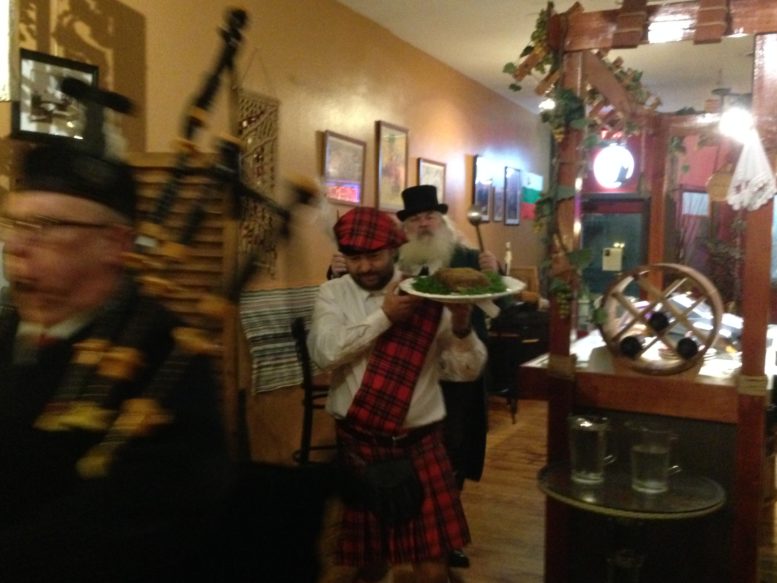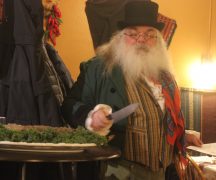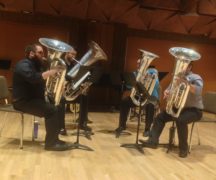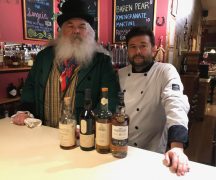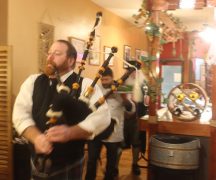By DAVID DUPONT
BG Independent News
All we needed Friday night was Robert Burns processing into Naslada Bistro with the haggis.
After all, we had bagpipes, and plenty of tartan, including Bulgarian chef Boyko Mitov clad in a tam o’ shanter, sash and kilt of Royal Stewart. And he wasn’t the only one baring his manly gams.
Later there would be poetry and song, and traditional Scottish dishes, and of course, many rounds of whisky.
The occasion was a celebration of the birth of Robert Burns, and if the bard of Scotland and bawdy bon vivant was absent is body – being dead some 220 years is a good enough excuse– he was certainly there in spirit.
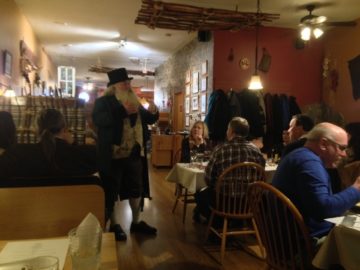
Elliot MacFarlane tells a story.
This is the second annual Burns Night held at the downtown restaurant. Or, as host Elliot MacFarlane said, the second and a half. Another Burns night was held Thursday. Demand for the first in 2016 prompted Mitov and MacFarlane to present it two nights this year. Burn Night Dinners are a tradition dating back to shortly after the poet’s death.
- Now on the face of it, a night devoted to the poetry and song of a long dead personage, with interlude grandly titled “The Immortal Memory” may sound a bit staid. The event was nothing of the sort. Haunch to haunch with the poetry and sentimental ballads were bawdy jokes. A Burns Night Dinner, MacFarlane said, was a time for flatulence and rude talk about the English. After uttering his first “fuckin’” while telling a story, he advised the several dozen gathered that the word was Scottish for “jolly.” The dinner was a jolly time.
In the old days, he said, the dinners could last for eight hours, and boys with wheelbarrows would be on hand to push the revelers home afterward. The Bowling Green event ended with everyone raising their voices in a chorus of “Auld Lang Syne.”
The frivolity began well before the first round of whisky, and only heightened with each succeeding shot.
“We need something in winter in Bowling Green besides hockey, so we have Robert Burns,” MacFarlane declared. Not that there’s anything wrong with hockey. He did after all grow up in Bowling Green.
All this was in keeping with Burns, a failed “ploughboy” and tax collector who found success as a wandering poet, who was welcomed in salons and taprooms. When he died at 37, 10,000 mourners attended his funeral. Still he was impoverished, leaving behind a wife and plentiful offspring, both by her and his many mistresses.
His work, though, has a deep and abiding impact on people. MacFarlane said that when Nelson Mandela was imprisoned for fighting against apartheid he took comfort in two books, “The Diary of Anne Frank” and a volume of poetry by “Robert Burns.”
Abraham Lincoln loved Burns, committing poems to memory. He would recite the verse as he traveled from court to court as a circuit riding lawyer in Illinois. When he was assassinated, he was carrying a collection of Burns’ poetry in his pocket.
Burns was a supporter of the American Revolution, helping to raise money to buy a cannon for the colonials.
So Burns would have been pleased to see those now living in America having a good time in his name.
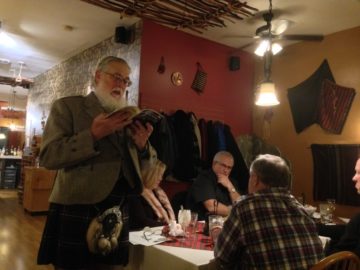
Dan Ferguson sings Robert Burns tune.
They feasted on a dinner that unfolded in five courses – one more than advertised—of dishes inspired by traditional Scottish fare, but filtered through Mitov’s culinary sensibility. So no organ meats in the haggis.
The haggis, the first course and the centerpiece of any Burns dinner, was described by Burns, as read by piper Kim Sautter, as “the great chieftain of the pudding race.”
Mitov explained that the haggis was made with locally sourced fresh lamb and grass-fed beef. As many of the ingredients as possible came from the area, he said. The menu also included traditional cock-a-leakie soup, so named because it’s made by stewing an old, tough male chicken and includes leeks.
Traditionally, MacFarlane said, the bird would be removed and the meat saved for another meal, but Mitov, using a much higher grade of bird, left the meat in the soup.
MacFarlane noted that these dishes reflect what food would be available to Scots in pre-industrial times in winter, no greens, but lots of root vegetables.
The “secret” course was beef tongue, served on a sliced of bread with a bit of cheese melted on top.
MacFarlane paired a Scotch with each course, the subtle flavors complimenting the food.
Complimenting all of this were the poems and stories. Dan Ferguson sang several Burns songs.
MacFarlane said Ferguson sang last year as a last minute addition. Ferguson had approached Mitov about singing just a day or so before the dinner. Mitov referred him to MacFarlane, who had no time to audition him.
He told Ferguson to show up, he could sing one song and if he wasn’t any good, he wouldn’t sing another. Ferguson had an ulterior motive. Last year’s dinner was sold out, and he wanted to attend.
Well, he sang more than a single song last year, and was back with several numbers this year, including “A Red, Red Rose.”
Also returning was Jacqui DeFriece, who drove in from Vickery. She was born and raised in Scotland and came to the United States to continue her religious studies.
She read Burns’ poem “To a Mouse,” her voice redolent with the cadence and tone of her homeland. Then she sang “Caldonia” by Dougie McLean, a contemporary Scottish songwriter.
She knows MacFarlane from other Scottish themed events. She’s tried she said to inculcate a sense of Scottish heritage in her children. That includes participating in Highland Games around the region.
DeFriece said the dinner reminds her of those back home though those ended with a night of dancing. Schoolkids still participate in competitions to test who can best recite Burns’ work from memory.
“I like coming here because I take my heritage seriously,” she said of the Naslada Burns dinner. “But it makes me a little sad because Scotland’s over there and I’m over here.”

